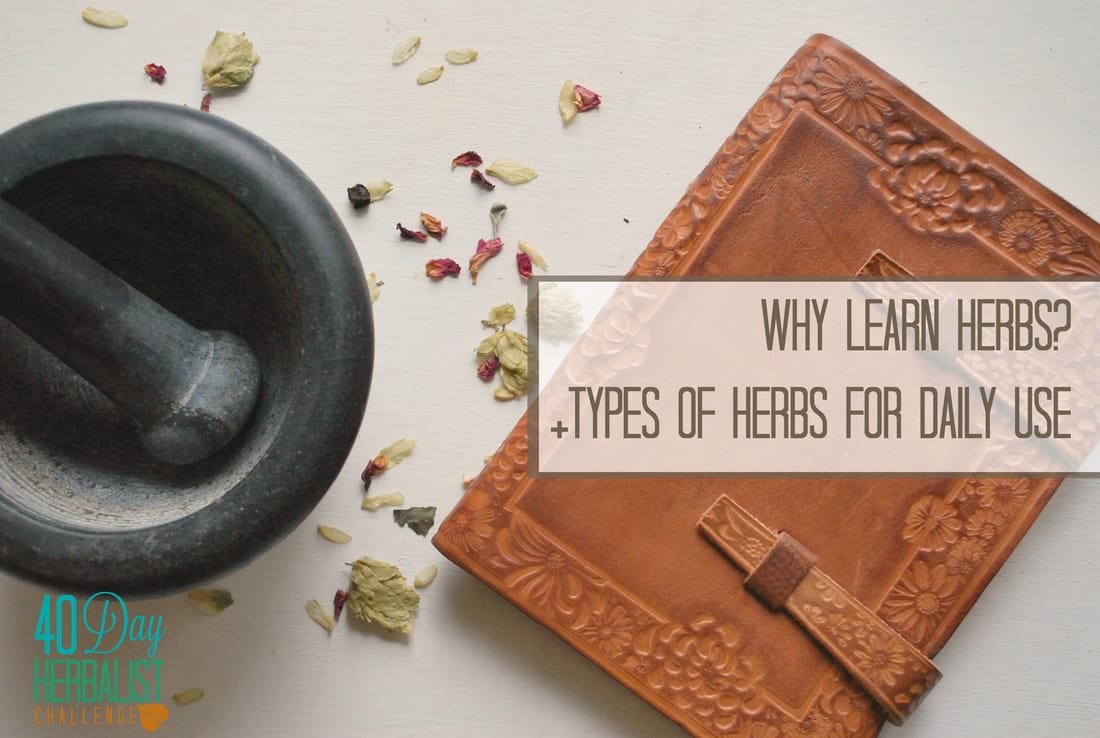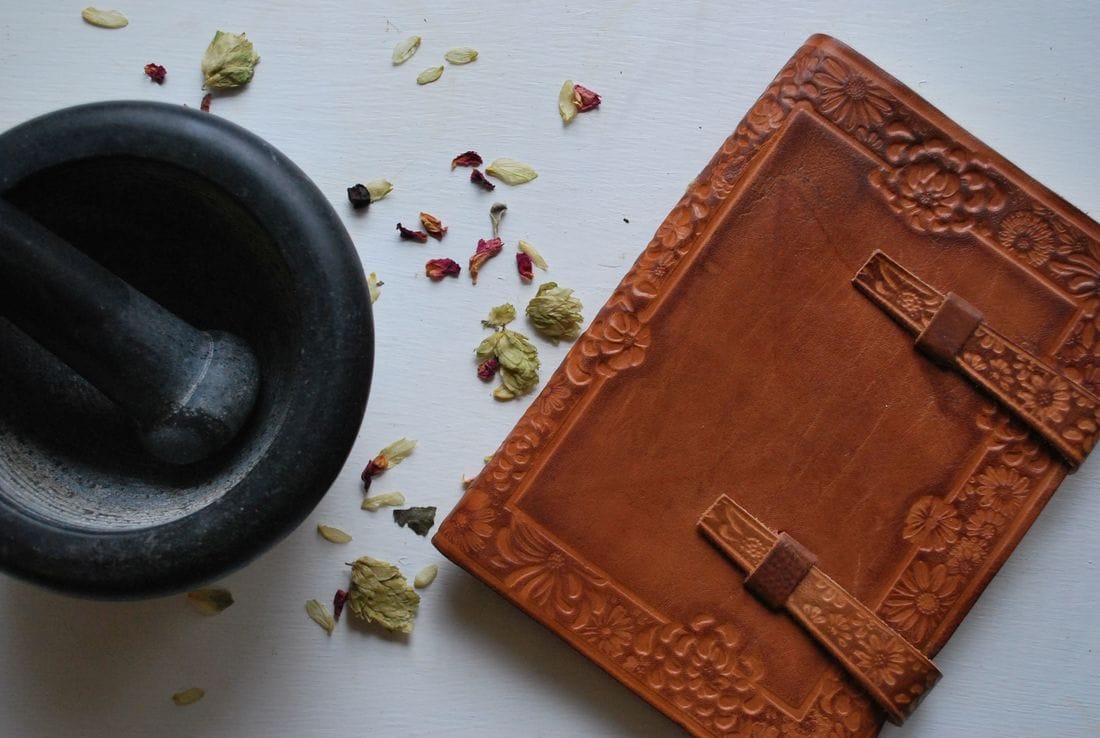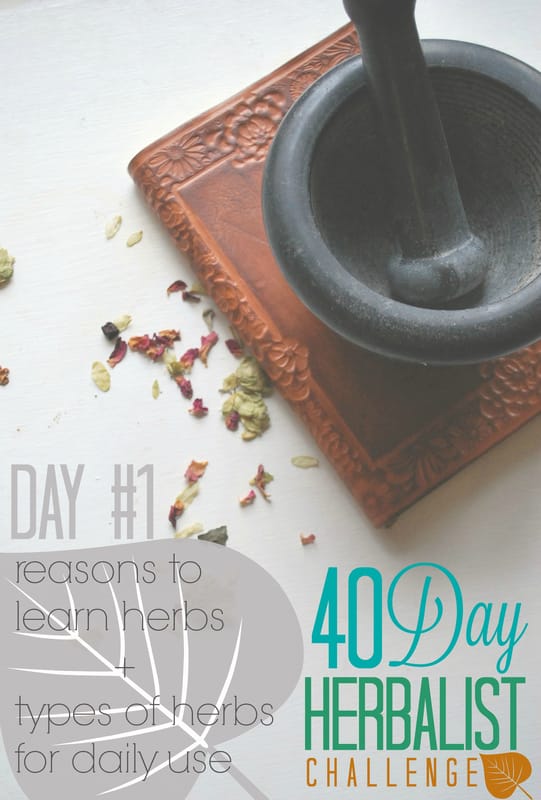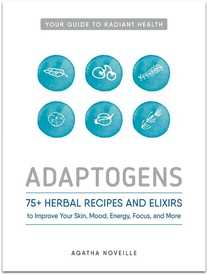Links contained in this post and elsewhere on my website may include affiliate links. When you make a purchase through these links, I earn a commission at no additional cost to you. I only link to products and services that I love - and that I think you will love, too!
Welcome to Day #1 of the 40 Day Herbalist Challenge! In today’s lesson, Reasons to Learn Herbs + How to Use Herbs Everyday, we will explore:
- 5 Reasons to Learn Herbs
- 5 Types of herbs to use everyday (ie not every type of herb can be used everyday)
- What herbs can and can’t do
This lesson may take a little longer to read through than some of the lessons that will follow, but it’s important to establish a good framework before we move ahead. Let’s get started!
40 Day Herbalist: Lesson One
20-30 Minutes
Supplies:
Notebook, pens/pencils
5 Reasons to Learn Herbs
If you are new to herbs, you may be wondering what all the fuss is about. Why should anyone learn to use herbs?
You may also be wondering what, exactly, herbs can and can’t do. You may have seen or heard some claims that seem far-fetched, or wondered if herbs live up to all the hype, or been curious to discover the full story. you can expect from learning in herbs in terms of what they can do.
Well, there are several very good reasons to learn herbs. Let’s take a look at 5 reasons that include some of the most popular, and then we will examine some of the things that herbs can do.
1. Herbs Support Health
Perhaps the most obvious reason that people learn everyday herbalism is because they are interested in supporting their health. Herbs have been used around the world for generations to do just that!
In the United States, our access to herbs is protected by the DSHEA legislation that officially classifies herbs as dietary supplements rather than drugs. This, and avoiding the practice of medicine without a license, means that it is important to be careful of the way we discuss herbs and herbalism. We’ll talk more about this later in the lesson, too.
2. Herbs are Enjoyable
Besides being useful for health and home, herbs are also enjoyable. They add a variety of flavors and new types of recipes to try. There’s an element of creativity that goes well with everyday herbalism! In addition, herbs can be used as incense, added to homemade bath and body products, and used to add a unique twist to cocktails and mocktails!
3. Herbs Foster Connection
Herbs can also provide a sense of connectedness to our past, to the earth, to our communities, and even to our future. Historical herbalism offers a fascinating glimpse into times past while learning to grow herbs or exploring where our herbs come from connects us to nature in the present.
Herbalism can be a solitary pursuit if we want, but it can also be based in community via sharing knowledge and recipes with friends, creating community gardens, and coming together for herbal events like fairs and workshops.
There’s definitely a grassroots element in herbalism that runs through historical times straight into the future as we look for ways to preserve herbal traditions and contribute to them moving forward.
4. Herbs Encourage Lifelong Learning and Curiosity
There is always more to discover about herbs. Herbalism can be an art practiced solely in the home, or lead to many fulfilling career paths. Either way, you will never run out of books to read, recipes to try, concepts to master, or new plants to learn about!
5. Herbs Inspire Resourcefulness, Savvy, and Confidence
Learning new skills that we can put to work in our own lives can be empowering. By mastering simple herbal skills, knowledge, and safe practices we open the door to a life enriched with the simple pleasures and vibrant support of one of humanity’s oldest gifts, cherished and passed from one generation to the next – the plants that we call herbs.
Types of Herbs to Use Everyday
Not every herb is suitable for everyday use. Some are meant for specialized support when your body needs a strong influence to help correct or maintain balance in the face of illness. Certain categories of herbs, though, are perfect for being included in our recipes and routines on a daily basis. It’s good to remember that some herbs can belong to more than one category, but a few examples for each category have been listed below.
Adaptogens
A class of herbs that support our bodies overall response to stress are known as adaptogens. These herbs are actually best if taken on a daily basis for an extended period of time. Herbs like tulsi, ashwagandha, and rhodiola fall into this category.
Bitters
These herbs are grouped into the same category because of their taste- they are all bitter! It turns out that our bodies need bitter tastes to function at their best. Bitter tastes (and herbal bitters) support our digestive processes in many, many ways – and optimizing our digestion is a great way to support health because the digestive tract is involved in so much more than simply breaking down food. It’s actually tied in to immunity and even mental and emotional health. Gentian is one of the most well known herbal bitters.
Tonics
Some herbs can help maintain or restore harmony of a particular organ or body system. These tonic herbs often have a strong affinity for a particular organ or body system but may have secondary actions for other organs as well. Elecampane is an example of a tonic for the lungs.
Nervines
These herbs support the health of the nervous system and emotional wellbeing. Not all of them are suited for everyday use, but they can still be a valuable addition to our daily wellness routines. Passionflower, oatstraw, and chamomile are all nervines.
Nutritive Herbs
Herbs that are as gentle and mild as a food are known as nutritive herbs. Dandelion greens, plantain, and nettle are often included in this category. Culinary herbs and spices used for flavorings are another great way to enjoy the benefits of herbs via nutrition!
What Herbs Can and Cannot Do
Congratulations! This is the last part of today’s lesson!
As I mentioned earlier, herbs in the United States are classified as dietary supplements, and we have to be mindful of the way we discuss them in order to avoid the practice of medicine without a license.
We can discuss how herbs were used historically, and we can also discuss the ways they can be used to support health in a general sense or the ways they can support the structure/function of our bodies. But it’s best to leave claims about curing or treating specific diseases out of the picture.
Let’s be clear: modern herbalism and medical treatment are two very different things.
They originate in two very different world views.
This isn’t necessarily as limiting as one might imagine. Instead of attempting to use herbs as a substitute for drugs and keeping is ingrained in a narrow understanding of “this herb for that disease”, it allows us to develop a deeper understanding of herbs, our health and our bodies from a more complex and holistic perspective.
Herbalism focuses on a holistic perspective – that your mind, body, and spirit are interconnected and each aspect supports the other. A change in one causes a change in the others, and you can be in balance with yourself. . . or out of balance. Herbs are most effective when you use them to help your body find its natural state of balance.
Contrast this with the modern approach to medical treatment, which focuses on disease. Once your doctor diagnoses an illness, they use drugs to target that specific disease. In the United States, only doctors can legally diagnose, treat, cure and prescribe. Again, herbs are legally classified as dietary supplements, not drugs, so it is important not to make claims that herbs can treat or cure. (And unless you are also a board certified MD, you shouldn’t be diagnosing or treating anything, either!)
Herbs, however, are very good at supporting our natural health and vitality, so that’s what we will be focused on for the 40 Day Herbalist Challenge, as you also learn how to master the basic skills of herbalism and explore different paths to becoming an herbalist.
During the rest of the course, we will discover:
- The basics of herbal safety
- How to make many different types of herbal preparations
- To recognize the names and basic uses of many common herbs
- The ways herbs can support our natural vitality, energy, immunity, and more!
Ready for your daily mission? Here it is!
Your Daily Mission
Learning herbalism is a lot easier when you keep a few things in mind. Knowing why you want to learn about herbs makes it easier to keep the big picture in mind, but it also helps you cut through all of the information available to focus on what you want to learn. There is so much information available that it’s easy to get overwhelmed and discouraged.
Instead, grab a notebook or open a computer file that you can use for the 40 Day Herbalist Challenge. Think about why you want to learn to use herbs, and make a list of your top three reasons. It may take a little brainstorming, and that’s ok. I try to revisit this question once a year, because it’s something that can change over time.
Next, think of three questions that you have about herbs and learning how to use them. These can be questions that have been in the back of your mind or something that you are actively looking for answers about. They could be related to herbalism in general, be about the process of learning herbs, or they might be related to one of your top three reasons for learning herbs.
Then, leave me a note in the comments below with your number one reason and your number one question (by Sunday, January 8th, 2017) and I will do my best to make sure it’s covered in one of our upcoming special edition 40 Day Challenge newsletters. Be sure you are signed up for the newsletter, too!
Don’t forget to follow and share with #40DayHerbalist on Instagram and Twitter for extra tips and project inspiration!
All the best,
Agatha



